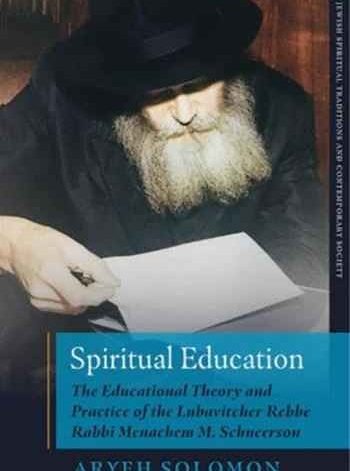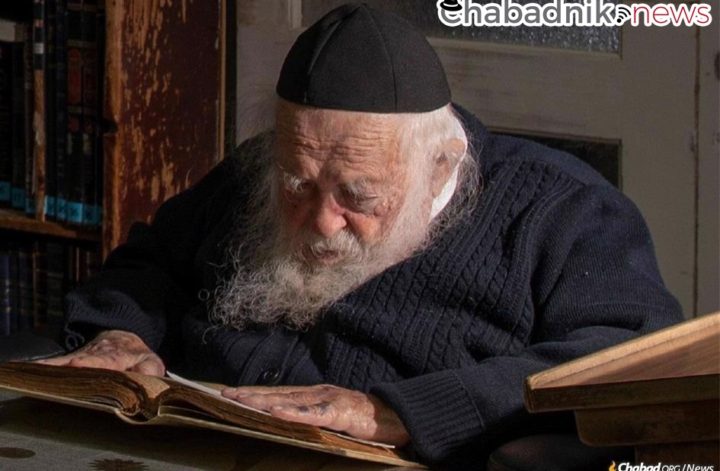5:30 a.m. It’s still dark outside when Chani Benjaminson, coordinator of Chabad.org’s “Ask the Rabbi” and Reader Feedback departments, sits down at her screen, steaming hot tea in hand, and begins to sort through the day’s mail. She’s on the lookout for the kind of questions that cannot wait: “Suicides, end-of-life issues, timely Shabbat and holiday-related matters,” says Benjaminson. She sifts through the hundreds of emails that have come through overnight, sorting the rabbinic questions and sending them on to the rabbis on the Ask the Rabbi team, each expert in their fields. For seven hours, this mother of seven fields and delegates questions of all kinds, from relationships (“My teenager refuses to go to synagogue!”) to Jewish law and tradition (“My father just passed away. What do I do now?”)
Benjaminson is the ultimate multitasker. In addition to her “Ask the Rabbi” responsibilities, she is a member of Chabad.org’s editorial staff; a native Italian, she oversees Chabad.org’s Italian-language site; and she and her husband, Rabbi Aaron Isaac Benjaminson, direct Chabad-Lubavitch of the South Coast, in North Dartmouth, Mass.
In recent weeks, and with the approach of the Passover holiday, celebrated this year from April 8 to April 16, Benjaminson finds herself fielding a constant barrage of questions—often working nonstop 12-hour days. In addition to the round-the-year urgent emails, she and the Ask the Rabbi team now have a new genre of time-sensitive queries: how to obtain matzah while in coronavirus quarantine; where to start with making a Seder; and how to kosher one’s dishes for Passover.
In some ways, this is familiar territory. For 23 years, Benjaminson has been responsible for questions from around the world, serving as a first point of call for hundreds of thousands of questions over the decades sent to what she calls “the online Chabad House.” But she notes that in both the volume and variety of questions, this year is unlike any other.
Founded by Rabbi YY Kazen in 1993, “Ask the Rabbi” had its beginnings on Fidonet, where in 1988 Kazen, “the father of Jewish cyberspace” began fielding all questions Jewish, alone. Today, “Ask the Rabbi” employs 22 dedicated men and women—rabbis, rebbetzins and mental-health professionals—to respond to queries from thousands every month, running the gamut of Jewish life and learning; from the most complex issues in Jewish law (“Rabbi, can we pull the plug on grandma?”) to contemporary Jewish thought (“What is the Torah’s perspective on the government’s responsibility regarding health care?”) in seven languages.
Influx of Questions on the Pandemic

Rabbi Eliezer Zalmanov has seen an influx of questions related to the pandemic and Passover.
One constant that hasn’t changed for Rabbi Eliezer Zalmanov in the corona-era is working at home. For 12 years now, Zalmanov has been a responder with Chabad.org’s “Ask the Rabbi” team, working from home in Munster, Ind., where he co-directs Chabad-Lubavitch of Northwest Indiana with his wife Chanie. What has changed for him though is the workload, Internet speeds and his children invading his workspace.
“Passover was always one of the busiest times of year for us,” he tells Chabad.org. In more certain times, he would field the usual Passover questions: “ ‘Where can I purchase organic spelt matzah?’ ‘I’m traveling to Israel for the holiday, do I celebrate only the first Seder?’ ”
Zalmanov has seen an influx of questions due to the pandemic. “It’s an uncertain time,” acknowledges the rabbi. “People aren’t sure, they don’t know what to do; we’ve never been in a time like this.” Many Passover plans had to be canceled and for some, this will be their first time making the Seder alone.
Many of the team’s questions come through as comments on Chabad.org articles.
“What we’re offering,” the rabbi notes, “is not just an answer to a question; I try answer the questioner, seeing where they are coming from, who is behind the question.” Particularly in these uncertain times, Zalmanov tries to lend emotional support. “People are grasping for something to make sense of the situation—an ear to hear them and a shoulder to lean on.”
In normal times, Zalmanov tries to give each query the full attention it deserves and to build a relationship with the person. But in these times, he’s simply swamped. “We’re ‘rabbinic triage’ at the moment,” he says, and he points out that while he is answering all questions that are sent to him, he is devoting additional time to those who are going through especially difficult times.
He and his colleagues deal with people from across the globe, providing rabbinic guidance where none might be available. Where there is an active Jewish community, he will encourage those he is corresponding with to connect with a rabbi and congregation where they live, and often help them to do so. But when that isn’t possible, he becomes their “local” rabbi, creating years-long relationships with some.
“I had a guy,” Zalmanov recalls, “who I’d known for years. He’d email often, and we developed a relationship. When I didn’t hear from him for some time, I’d send an email, asking how things were going.” At one point, the rabbi hadn’t heard from his correspondent for some weeks and became concerned. He sent him an email checking up on him. The man had a seizure and collapsed in the street, going into a coma for two weeks. He wasn’t in great condition, and hovered between life and death. “When he woke up,” the rabbi recounts, “he saw that I had emailed him the very day he’d collapsed,” and was extraordinarily grateful.
The type of questions coming in are the kind most rabbis don’t get in other years. “We have to risk our health going to the grocery store for Passover food during the coronavirus pandemic,” one individual asked. “There will be a lot of other shoppers close to us, and it will take time for us to choose items. Is it OK to skip Passover this year, for health reasons, because of the coronavirus pandemic? Please answer soon. Thank you!”
“What about Pesach Sheni because of the coronavirus? Can we postpone a month because of the pandemic and with the hope of being able to celebrate with family? And if we postpone, when do you observe the week in terms of dietary laws? Thank you!”
When faced with questions such as these, Zalmanov will usually reach out to the local Chabad emissary and have a Seder-to-Go kit delivered by the rabbi. And with the concerns about relatives being unable to participate, Zalmanov has a solution: “While nothing can replace celebrating with family,” he explains, “We are encouraging people to spend time with their loved ones on Zoom on the day before the Seder begins.”
While technology can’t be used on Shabbat or holidays, Zalmanov’s colleagues have come up with a plan for the afternoon before the Seder to set the table for the Seder, dress the children in their holiday finery, and then an hour or two before the onset of the festival, invite Grandma and Grandpa to join virtually in singing the traditional Passover songs, and watch the children recite the “Mah Nishtanah,” (“Four Questions”). Then, at least 18 minutes before sunset, wish everyone a “Good Yomtov” and say goodbye. “Make sure to repeat the sections you’ve read after dark,” the rabbi advises, “and carry out the Seder once more, this time with the matzah and four cups [of wine or grape juice].”
A memorable encounter that the rabbi had was when a woman, alone with no local community, reached out, very disturbed. She realized that she’d miscalculated that date of Yom Kippur, thus fasting on the wrong day. “It was almost like a Baal Shem Tov story,” Zalmanov describes it. The rabbi thoughtfully consoled the distraught woman, explaining that one must look towards the future rather than dwell on the past.
“I cannot tell you how much better I feel,” she replied. “I understand everything you said, but I guess I needed for someone to tell me. It’s been hard since my mother passed away, and there are no other close relatives and there is not a Jewish community where I live. The closest synagogue that I am aware of is over 40 miles away. I have signed up for emails and you are right; I will never confuse this day again.”
When the Experts Need Advice
Benjaminson, Zalmanov and their colleagues may not personally be able answer everything that comes their way, but the Ask the Rabbi team has a process in place to ensure that every question is answered. Rabbi Simcha Bart, a veteran “Ask the Rabbi” responder working from Los Angeles—with a knack for relationship matters—will still often consult with and refer matters to the team’s in-house social-workers when necessary. Zalmanov, whose specialty is Jewish law, says he doesn’t always feel qualified to answer the most difficult questions that land in his inbox, “When I receive complex queries, often dealing with life-and-death issues, we have Halachic-decisors who we consult with, rabbis who are expert in various areas of Jewish law, who are better equipped to answer these questions.” Some of the more obscure areas of Jewish law aren’t always clear-cut and must be studied carefully by an expert, who will rule on a case-by-case basis, he explains.
“Dealing with these questions over the years,” muses Zalmanov, “has taught me much more than I learned in rabbinical school. I feel I’ve gained more answering these questions than the people I’m communicating with.”
“Sometimes,” adds Benjaminson, “the most meaningful response is simply being there and showing that someone cares.”




